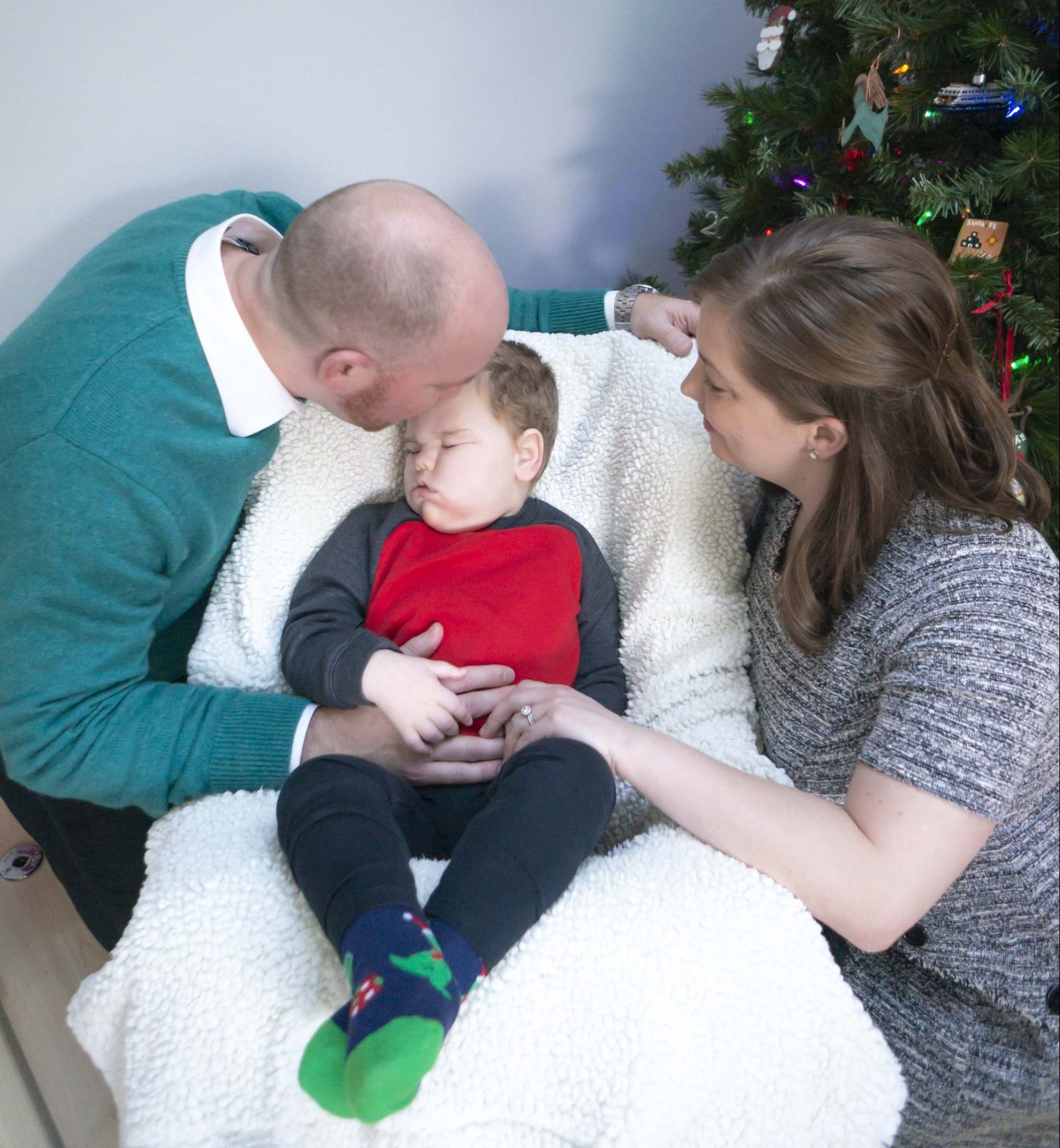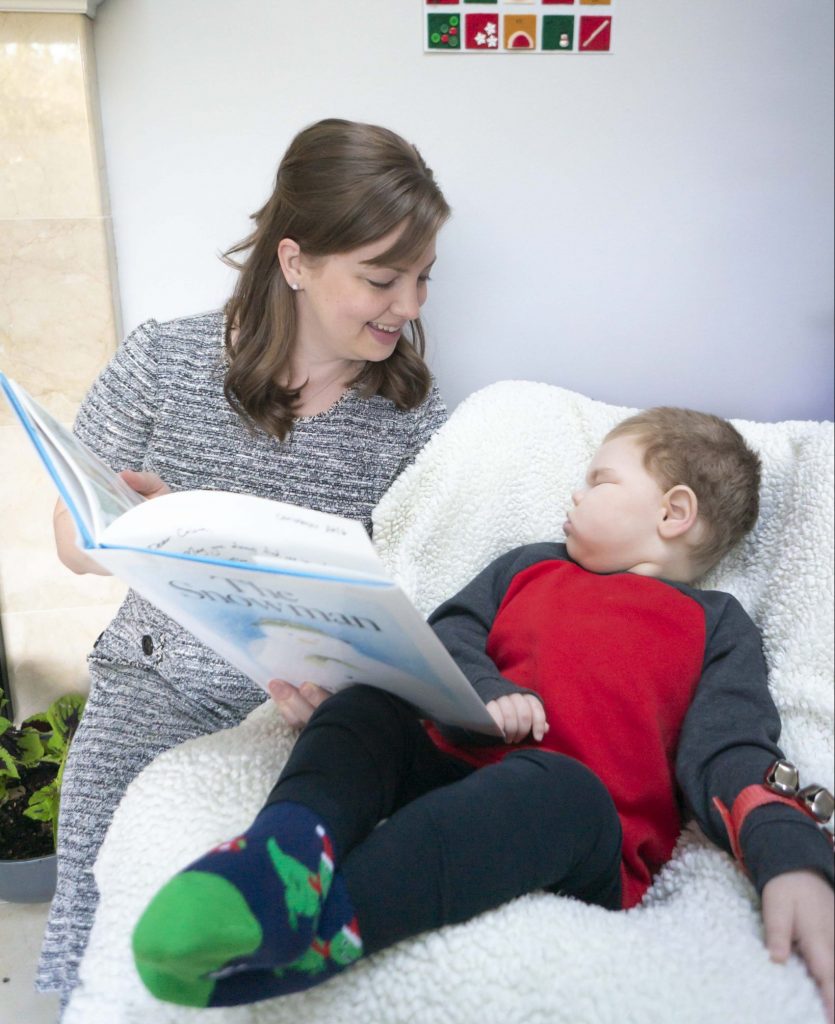12/6/2021
·Enable high contrast reading
Tips to Turn Your Attention Inward During the Holidays

December is bound to be bittersweet. The dark, short days encourage introspection, and the solstice stimulates intention for another spin around the sun. And then there’s the onslaught of The Holidays. For the purposes of this post, I consider The Holidays all of the things that inundate our collective social consciousness every October, November and December. The cultural and spiritual traditions of families that are often complicated by social obligations or commercial exploitation. There’s a growing dialogue about the stress these celebrations can cause for families – a stress that runs in complete contrast to their purpose to connect and reflect. Regardless, any phenomenon that causes stress for “typical” families is bound to be exacerbated for families caring for medically complex kids.
Here, I share a few of the challenges I experienced during The Holidays as Colson’s mom and primary caregiver, and some of the coping tools I found helpful.
 The pressure to make The Holidays memorable and meaningful is intense when your child is ill. Parents are battered by difficult thoughts like, “What if this is the only one we get?” or, “Is this our last one together?” It’s hard to feel merry and bright when you live with a lingering sense of dread. We coped with this by creating simple traditions that were easy to execute and infused with intention. For Colson’s birthdays in October, we bought cupcakes from the same bakery. Every Christmas, we’d take him to a local bookstore to get a new Christmas story and write a message inside the cover. These touchpoints gave us something to look forward to when he was with us and have given us traditions to carry forward now that he is gone.
The pressure to make The Holidays memorable and meaningful is intense when your child is ill. Parents are battered by difficult thoughts like, “What if this is the only one we get?” or, “Is this our last one together?” It’s hard to feel merry and bright when you live with a lingering sense of dread. We coped with this by creating simple traditions that were easy to execute and infused with intention. For Colson’s birthdays in October, we bought cupcakes from the same bakery. Every Christmas, we’d take him to a local bookstore to get a new Christmas story and write a message inside the cover. These touchpoints gave us something to look forward to when he was with us and have given us traditions to carry forward now that he is gone.
Another challenge is that the desire to include family in celebrating The Holidays presents logistical challenges that compound emotional intensity. My husband Jacob and I are fortunate that we come from families that are very flexible with expectations around The Holidays. Instead of asking each other, “What do we want to do for Thanksgiving?” Jacob and I got good at asking, “How do we want Thanksgiving to feel?” Focusing first on how we wanted to feel with Colson on our holidays helped us set clear expectations about what we wanted to do. Our families were always supportive. For Colson’s first Thanksgiving, when he was just barely a month old and recently released from his first hospitalization, we wanted all of his family to be together. Grandparents, aunts and uncles on both sides rallied to be with us and him. We took turns visiting different sides of the family in subsequent years, and last year, did remote Thanksgiving calls with our families due to COVID-19. Leading with our intention let us set clear expectations with others and be accountable to each other.
Even with meaningful traditions and clear intentions, the biggest challenge remains. Anticipatory grief is amplified during The Holidays. Our family celebrates Christmas. One of my favorite traditions is attending the Festival of Lessons and Carols, an annual performance series presented by the Seattle Boys Choir. The performers range in age from 5 to 17. Every year during Colson’s life, I would watch the boys sing carols and recite Biblical passages while pondering my own boy’s mortality. His first Christmas, I wondered if he would live long enough to join the chorus. If he would get big enough, or capable of expressing an interest or developing the skills to join this choir of angels. And even that first year, something inside me knew the answer was “no.” That feeling grew stronger and stronger each year, as Colson’s mitochondrial disease progressed. And while our ability to make The Holidays with Colson memorable and inclusive grew each year, so too did the burden of my anticipatory grief.
I began work with a therapist to address my anticipatory grief and generalized anxiety very shortly after Colson’s diagnosis as an infant. But by the time he was a toddler, I found myself unable to manage these complex feelings with only the tools and skills I was developing in therapy. I was constantly irritable during The Holidays one year, despite Colson being quite stable and content at the time. Shortly thereafter, I had a panic attack before a very routine phone call for my job. It was then that I knew I needed more help.
That January, after consulting with my therapist and primary care provider, I began taking medication to treat depression and anxiety. I was shocked by how helpful medication was for me. It by no means made my experiences in complex caregiving less intense. It didn’t dissipate my anticipatory grief. It did, however, take the edge off of my reactions to these experiences. I still felt the grief, but it wasn’t compounded by endless irritability. I still felt overwhelmed by the logistical complexity of being Colson’s primary caregiver, but that overwhelm didn’t debilitate me as frequently.
 If you are caring for a medically complex child, I encourage you to give yourself the gift of attention this year. Pay attention to your feelings during The Holidays, and how they show up in your head, heart, and body. Enjoy the positive ones and listen to the difficult ones. What are they telling you? Do you need more time with your extended family, or less? Do you need ideas for making memories in a way that celebrates your child’s unique needs, or are you overwhelmed by perfunctory traditions that don’t hold meaning to your family? Is the stress you feel sustainable, or do you need more help? Your palliative care team can help you identify what might be most useful for you to continue to play your critical role. It’s natural for your needs to change over time, just as your child’s do. Use The Holidays as an opportunity to examine the care you give yourself, as it makes the care you give your child shine so much brighter.
If you are caring for a medically complex child, I encourage you to give yourself the gift of attention this year. Pay attention to your feelings during The Holidays, and how they show up in your head, heart, and body. Enjoy the positive ones and listen to the difficult ones. What are they telling you? Do you need more time with your extended family, or less? Do you need ideas for making memories in a way that celebrates your child’s unique needs, or are you overwhelmed by perfunctory traditions that don’t hold meaning to your family? Is the stress you feel sustainable, or do you need more help? Your palliative care team can help you identify what might be most useful for you to continue to play your critical role. It’s natural for your needs to change over time, just as your child’s do. Use The Holidays as an opportunity to examine the care you give yourself, as it makes the care you give your child shine so much brighter.
Liz Morris loves exploring complex questions. Her professional experiences in project management, librarianship, and community development prepared her well for her favorite role as mom to Colson. Colson, impacted by mitochondrial disease since birth, inspired Liz to face the complicated aspects of his life through writing and advocacy. Liz serves as a family advisor at Seattle Children’s Hospital, and is a volunteer ambassador for the United Mitochondrial Disease Foundation. She is committed to helping families find the information they need to help them live well in the face of life-limiting illness. You can find Liz on Instagram @mrsliz.morris





